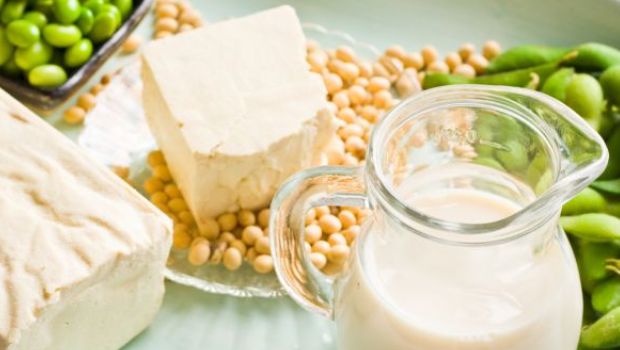
Whey or Soy, Which Protein is Good For Health?
Of course, everybody knows that the best way to up our protein intake is by regularly eating protein-rich food, whether vegetarian or meat-based in origin. But not all of us get enough in our daily diet, especially if we exercise regularly (which we should), or want to gain muscle and lose fat. And so, as a complement to mealtimes, a lot of people turn to soy and whey supplements; two of the most popular supplements, they are excellent sources of protein and contain a bunch of other nutrients.
The Case For Soy
Let us look at soy, first. The soybean is native to South East Asia and East Asians have been consuming it for centuries, in tofu, miso etc. It has slowly been making inroads into the Western diet as well. Soy’s high protein content (it is a complete protein, with all of the amino acids required by the body) makes it an ideal food for improving bone health, but it is also good for slightly lowering cholesterol and high blood pressure, and reducing the symptoms of menopause. A cup of soybeans provides nearly as much protein as a steak! Soy supplements may have soy protein, isoflavones (compounds that affect the body in a similar way to that of oestrogen), and other soy components. So far, so good.
The Case Against Soy
But soy has been mired in controversy. Because of its isoflavones, it has been blamed for promoting breast cancer growth, reduction in testosterone, and lead to a possible thickening of the endometrial lining, which may lead to endometrial cancer. Plus, there is a small chance that you may be allergic to soy, which means that horrid bloaty feeling and many trips to the restroom.
This is all very scary of course, but if you take a look at the website for the National Center for Complementary and Integrative Health (a subsidiary of the US Department of Health and Human Services), here is the conclusion it has reached. “Except for people with soy allergies, soy is believed to be safe when consumed in normal dietary amounts. However, the safety of long-term use of high doses of soy extracts has not been established.” The Center has cited various unbiased references published in respected scientific journals, as proof. Just as in everything else, before you embark on any soy-related adventures, it is always best to get advice from a qualified medical practitioner.
Let’s Look at Whey
And now, let us look a little closer at whey. Whey comes from cow’s milk, a by-product of manufacturing cheese, and it is remarkably popular as a component of baby formula, in nutrition shakes and protein supplements. It is the water-soluble part of milk.
Just like soy, whey is a complete protein with all 22 of the amino acids that the body requires from external sources, plus it offers calcium and iron. Some studies have shown that whey greatly improves muscle protein synthesis (more than most other protein sources) and apparently reduces the fat content in liver, to some extent.
This is all very well for most of us, but obviously impossible for a lactose-intolerant person. It is also believed that whey might exacerbate pre-existing kidney or liver problems. Whether or not this is true, I supply my standard warning – please go to a doctor, before you start ingesting whey as a protein
supplement.
Whey Versus Soy
In a protein battle between the biggies, whey and soy, who would come out tops? According to a June 2014 study in the Journal of Applied Physiology, the answer is both. In the study, impressively entitled ‘Soy-dairy protein blend and whey protein ingestion after resistance exercise increases amino acid transport and transporter expression in human skeletal muscle,’ 16 young men took part in a double-blind clinical trial. They were studied at rest and after exercise, after consuming a soy-dairy protein blend or whey protein.
The result was this. “In summary, we found that the increase in postexercise phenylalanine net balance across the leg (an indicator of muscle protein anabolism) was prolonged with ingestion of a protein blend compared with whey protein. We also report that ingesting a protein blend or whey protein enhances the rate of amino acid transport into muscle, increases select amino acid transporter (LAT1/SLC7A5, CD98/SLC3A2, SNAT2/SLC38A2, PAT1/SLC36A1, CAT1/SLC7A1) mRNA expression, and increases postexercise myofibrillar protein synthesis.”
In case you stopped reading after the first sentence, what it means, more or less, is that a protein blend is perhaps the most effective, for muscle protein anabolism, after exercise. However, when it comes to weight loss, whey protein may have a slight edge over soy. One paper had them pitted together in a study of 73 overweight or clinically obese adults. At the end of the study, soy protein supplementation led to neither weight loss nor gain, but the whey protein supplementation led to a nearly 2 kg drop (1.8, to be precise) over a period of 23 weeks.
What do you prefer?
At the end of the day, it all comes down to personal preference. Not everyone’s body reacts to soy and whey in the same way; it is necessary to do one’s research, speak to a fitness trainer and doctor, and then determine what works best for you.
Whatever you decide, remember, it’s always best to get your protein from food. But if you can’t, there’s plenty you can do with the whey and soy protein powders out there. For instance, toss them into your porridge, pour them into a smoothie, add it to your morning muesli bowl, even bake them into your cookies or muffins. That way, you get all of the nutrition and none of the taste!
* This article was originally written and published on http://food.ndtv.com/food-drinks/whey-or-soy-which-protein-is-good-for-health-1662775

